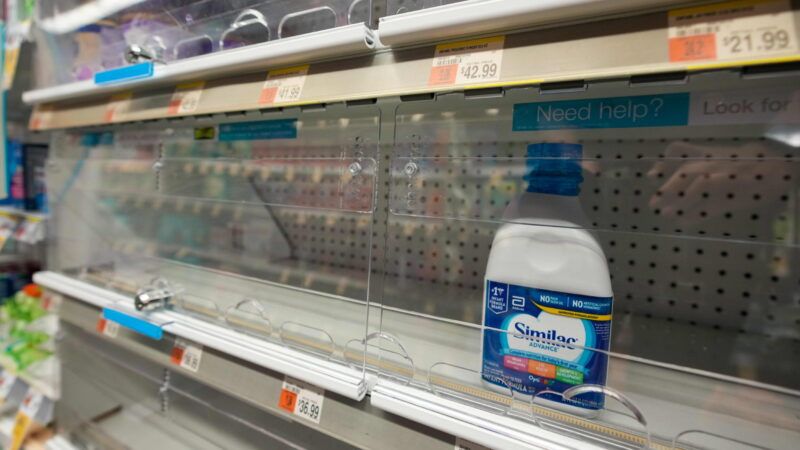Taking Formula From Immigrant Babies Won't Fix the Shortage
If you put infants in federal custody, you're obliged to feed them.

In the midst of a national baby formula shortage, some Republicans have found a scapegoat: undocumented immigrant kids.
Several GOP lawmakers have taken to Twitter in recent days to criticize the Biden administration for sending "pallets" of baby formula to migrant detention facilities, supposedly funneling supplies away from American-born mothers. Their claims are light on detail and sometimes downright deceptive, ignoring the actual reasons for the shortage as they clumsily shift the blame to a relatively small group.
Rep. Kat Cammack (R–Fla.) helped spur the outrage after tweeting photos comparing formula supplies at what she said were local grocery shelves and the Ursula processing center, an immigrant detention facility. "This is what America last looks like," Cammack declared.
The first photo is from this morning at the Ursula Processing Center at the U.S. border. Shelves and pallets packed with baby formula.
The second is from a shelf right here at home. Formula is scarce.
This is what America last looks like. pic.twitter.com/OO0V99njoy
— Kat Cammack (Text KAT to 50138) (@Kat_Cammack) May 11, 2022
Holes in Cammack's story soon began to appear. Newsweek obtained a comment from an Ursula official who said "that there were no pallets of baby formula there and that only single adults are currently housed at the facility." What's more, the photo Cammack tweeted that supposedly highlights an empty shelf "right here at home" appeared in a March 11 article from El Paso. It was used at least twice in April.
Rep. Troy Nehls (R–Texas) echoed Cammack's concerns, tweeting: "Baby formula should go to Americans before illegals. This should not have to be said." Texas Gov. Greg Abbott and the National Border Patrol Council released a joint statement saying that the Biden administration's decision to provide baby formula to undocumented immigrants is "reckless" and "out-of-touch."
Migrants in detention centers aren't free to leave facilities whenever they want to shop for baby formula. Legally, essential products must be provided to migrant children that the government has detained. "Facilities will provide access to…drinking water and food as appropriate," reads the 1997 Flores settlement that addressed the treatment of migrant children. A 2015 Customs and Border Patrol document on detention standards noted that "food must be appropriate for at-risk detainees' age and capabilities (such as formula and baby food)." These legal standards predate the Biden administration.
Nor would diverting baby formula away from immigrant detention centers ease supply chain woes in a meaningful way. Ursula—the facility Cammack singled out on Twitter—holds around 1,100 detainees. The number of American parents who rely on formula to feed their infants is on the order of millions. Though several Republican lawmakers and right-leaning news outlets are agitating about the "pallets of baby formula for all of the illegals who are crossing into the United States," none have been able to say exactly how much formula is going to detention facilities or how often shipments are arriving.
The baby formula shortage is indeed a huge problem. About 40 percent of top baby formula brands are out of stock right now, and producers are warning that shortages could last for several months. But the shortage wasn't caused by the government's legal duty to feed the kids it has confined. "Much of the current shortage is rooted in a February recall of formula after a suspected bacterial outbreak at an Abbott Nutrition plant in Michigan," explains Reason's Eric Boehm. And while we could re-fill those shelves with formula from abroad, tariffs and quotas "make it burdensome and costly to import the supplies that are now desperately needed."
You can't solve the national shortage by making it harder for undocumented parents to feed their babies. Instead of looking for immigrant scapegoats, lawmakers should tackle the trade and regulatory policies that helped create the current shortage.


Show Comments (133)